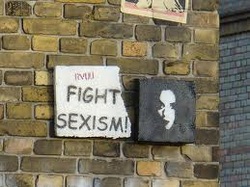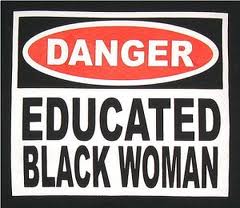Although perhaps not a stand-out point of Drinking Coffee Elsewhere,
the effects of a patriarchal society are very visible in several
of this collection's stories.
Fight Sexism!

“Ironically, many African Americans deny the existence of sexism, or see it as a secondary concern that is best addressed when the more pressing problem of racism has been solved. But if racism and sexism are deeply intertwined, racism can never be solved without seeing and challenging sexism.”
Patricia Hill Collins
Black Sexual Politics
Patricia Hill Collins
Black Sexual Politics
Sexism Today
In the YouTube video below, Reporter Robert Gibbs repeatedly talks town to Black Female reporter, April Ryan. In the clip he repeatedly tells Ryan to relax and breathe, and further compares her questions to that of a child, infantilizing her. Can you even imagine for a moment, a White Male reporter getting the same sort of treatment? We cannot ignore the simple fact that he is White and Male and she is Black and Female, as it is clear that gender and race played a huge role in the way that Ryan was treated. Had Gibbs felt for one moment that he was engaging with an equal, he would not have attempted to behave in the same manner.
From birth Black women must battle against both sexism and racism to live their lives. These are two distinct marginalizations that work to construct Black Women as "Other". Often their is a cry from Black Men for Black Women to join them in the fight against racism because it actively effects their lives, however when sexism comes into play, it is seen as unimportant, and even Black Men are quick to invoke their patriarchal privilege. In the end, Black men want more than freedom from racism, they want the freedom to act with the same sort of privilege that has historically been the preserve of White men. Equality in this instance, means the ability to oppress.
From birth Black women must battle against both sexism and racism to live their lives. These are two distinct marginalizations that work to construct Black Women as "Other". Often their is a cry from Black Men for Black Women to join them in the fight against racism because it actively effects their lives, however when sexism comes into play, it is seen as unimportant, and even Black Men are quick to invoke their patriarchal privilege. In the end, Black men want more than freedom from racism, they want the freedom to act with the same sort of privilege that has historically been the preserve of White men. Equality in this instance, means the ability to oppress.
"When you have been made to feel bad for so long, you jump at the chance to do it to others"
Laurel in Brownies
Drinking Coffee Elsewehere
Laurel in Brownies
Drinking Coffee Elsewehere
_Check out the original article here!
The characters in Drinking Coffee Elsewhere struggle against patriarchal ideas of femininity
Examples from the Text:
Every Tongue Shall Confess: Sister Clareese is fighting against the patriarchal idea that she should be committed to a man by this point in her life, and continues to assert her independence even while it fuels gossip and ridicule among her friends at work and in her black church community. In doing so, Clareese also addresses the more general patriarchal idea that a woman’s worth lies in her sexuality.
Every Tongue Shall Confess: Sister Clareese is fighting against the patriarchal idea that she should be committed to a man by this point in her life, and continues to assert her independence even while it fuels gossip and ridicule among her friends at work and in her black church community. In doing so, Clareese also addresses the more general patriarchal idea that a woman’s worth lies in her sexuality.
“Oh, Sister Clareese! We should make you a deacon!” (Deacon McCreedy)
“Of course they didn’t. Deacons, like pastors, were men” (Sister Clareese).
Every Tongue Shall Confess
Drinking Coffee Elsewhere
“Of course they didn’t. Deacons, like pastors, were men” (Sister Clareese).
Every Tongue Shall Confess
Drinking Coffee Elsewhere
The Church deacons do not value Clareese for her opportune ideas and continuous participation, but instead, as Deacon McCreedy proved when he covered Clareese’s “wandering eyes” and slid his hand up her nurse’s uniform, they value her only for her sexuality.
Drinking Coffee Elsewhere: Dina fights against society’s damaging expectations, continuing to read and become an intellectual, even while it isolates from her black community. In doing so, Dina also addresses patriarchal ideas on women, intelligence, and education.
“She shouldn’t have to fit into any white, patriarchal system”
Orientation leader in Drinking Coffee Elsewhere
Drinking Coffee Elsewhere
Orientation leader in Drinking Coffee Elsewhere
Drinking Coffee Elsewhere
The Effects of Patriarchal Society in Drinking Coffee Elsewhere
The Importance of Belonging to a Community
While Patriarchal society marginalizes the female characters of Drinking Coffee Elsewhere, the women still yearn to belong to the same community by which they are isolated
“Black women can never become fully empowered in a context that harms most Black men, and Black men can never become fully empowered in a society in which Black women cannot fully flourish as human beings.”
Patricia Hill Collins
Black Feminist Thought
Patricia Hill Collins
Black Feminist Thought
“Freedom has been misinterpreted as autonomy and separation from others. Instead, freedom should include the ability to have meaningful relationships with others”
Carol Gilligan (feminist relational psychoanalyst)
Carol Gilligan (feminist relational psychoanalyst)
Putting it together

Community “Is not only a physical state but is also…a mental state where two or more people share connection”. Thus, finding community is not as simple as living among a group of people, it is a deeper, and much more meaningful connection.
The former definition of freedom has left African American women in particular danger of “losing sense of self and assimilating into the other” (Howe). Therefore, the characters in this collection resist some connections because the threat of “losing their hard-earned autonomy” (Howe) is too looming
Katy Howe in her Masters Dissertation
Isolation & Community in Short Story Collections
Examples from the Text
For Doris in Doris is Coming , connecting with her community on an emotional level, rather than a physical one, consists of her relinquishing her inherent rights as an African American, a woman, even those she posses as a citizen of the United States. Instead she is pressured to embrace traditional roles of female (staying out of it), rather than partake in a sit-in.
For Tia in Speaking in Tongues, in order to truly fit into Desi’s world, she too must give up her inner value as a woman, and submit to the male obsession with sexuality. In the same story, Marie, a prostitute, has already committed to this “assimilation”, and is already well established as Desi’s “business partner”.
Sister Clareese will also have to give up fundamental parts of herself in Every Tongue Shall Confess, in order to fit into her religious, patriarchal society.
Even young Laurel from Brownies, will have to give up the part of her that realizes that her father, and all other men, are not inherently superior, if she is to fit in with the rest of her community.
Dina, in the short story, Drinking Coffee Elsewhere, is an intellectual who is isolated from her lower class black community, where it is not even acceptable to read:
For Tia in Speaking in Tongues, in order to truly fit into Desi’s world, she too must give up her inner value as a woman, and submit to the male obsession with sexuality. In the same story, Marie, a prostitute, has already committed to this “assimilation”, and is already well established as Desi’s “business partner”.
Sister Clareese will also have to give up fundamental parts of herself in Every Tongue Shall Confess, in order to fit into her religious, patriarchal society.
Even young Laurel from Brownies, will have to give up the part of her that realizes that her father, and all other men, are not inherently superior, if she is to fit in with the rest of her community.
Dina, in the short story, Drinking Coffee Elsewhere, is an intellectual who is isolated from her lower class black community, where it is not even acceptable to read:
“On Greenmount Avenue you could read schoolbooks -- that was understandable. The government and your teachers forced you to read them. But anything else was antisocial. It meant you’d rather submit to the words of some white dude than shoot the breeze with your neighbors” .
Dina in Drinking Coffee Elsewhere
Drinking Coffee Elsewhere
Dina in Drinking Coffee Elsewhere
Drinking Coffee Elsewhere
Dina is isolated from her own community because of her intellect and because of the fact that she always has a book in her hand. In order to 'fit-in' Dina will have to abandon her passion for learning and reading.
